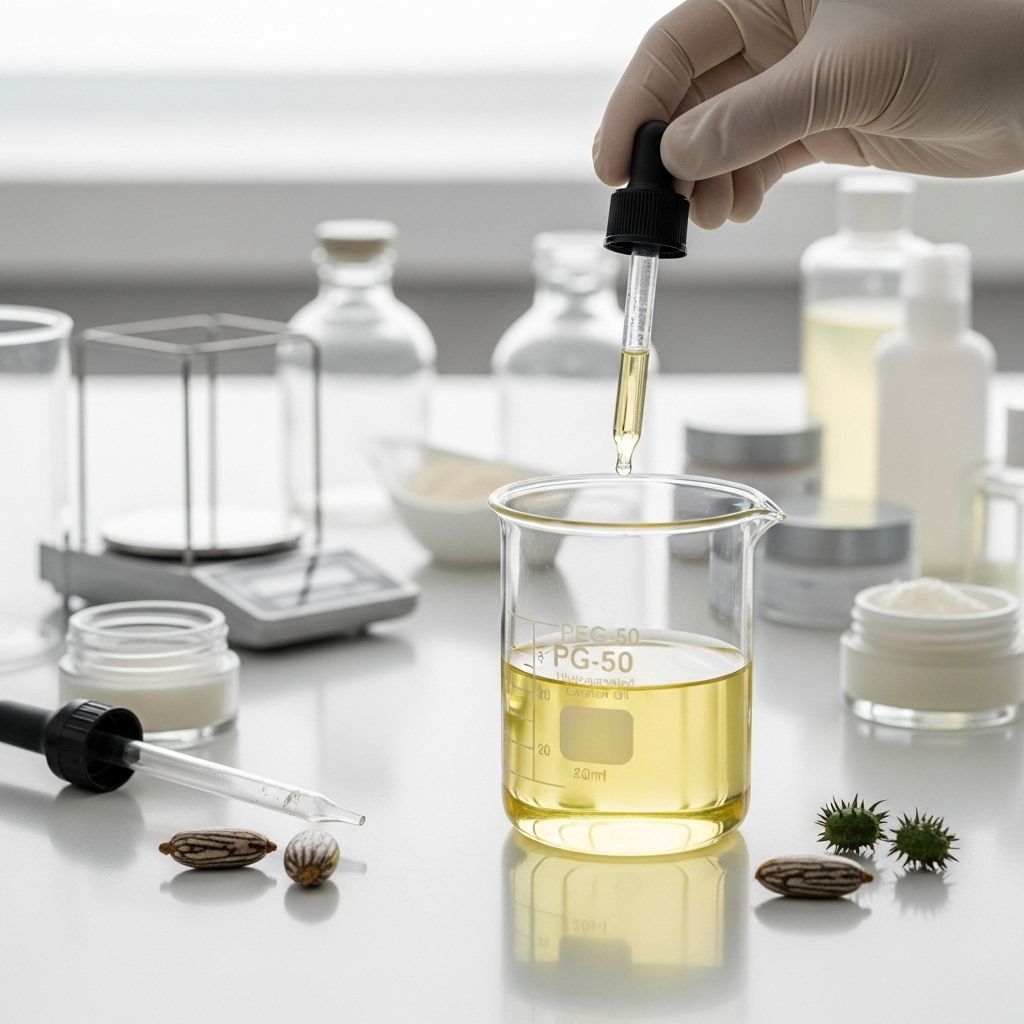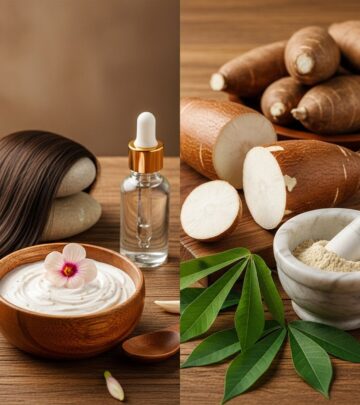PEG-50 Hydrogenated Castor Oil: Uses, Safety & Science in Cosmetics
A comprehensive guide to the properties, applications, and safety of PEG-50 Hydrogenated Castor Oil in personal care products.

PEG-50 Hydrogenated Castor Oil: The Essential Cosmetic Ingredient
PEG-50 Hydrogenated Castor Oil is a versatile and widely used ingredient in cosmetics and personal care products, favored for its ability to act as an emulsifier, solubilizer, and skin conditioning agent. This guide delves into the ingredient’s origin, chemical structure, cosmetic functions, safety profile, and much more, making it an authoritative resource for both consumers and industry professionals.
What is PEG-50 Hydrogenated Castor Oil?
PEG-50 Hydrogenated Castor Oil is a synthetic compound obtained by the ethoxylation (attachment of polyethylene glycol chains) of hydrogenated castor oil—itself a derivative of castor oil (from Ricinus communis seeds). It typically appears as a white to off-white waxy solid, highly valued for its compatibility with water and oil phases.
- INCI Name: PEG-50 Hydrogenated Castor Oil
- Chemical Structure: Polyethylene glycol ether of hydrogenated castor oil (average of 50 ethylene oxide units)
- Physical Form: Waxy solid or viscous liquid, depending on molecular weight
Origin and Manufacturing
The process to create PEG-50 hydrogenated castor oil begins with natural castor oil, which is first hydrogenated to produce a saturated, more stable oil. This is then reacted with ethylene oxide in a controlled process called ethoxylation. The ’50’ in the name refers to the approximate number of ethylene oxide units, which influence its solubility and physical properties.
- Source: Castor oil is plant-derived, while the PEG component is synthetic.
- Synthesis: Combines natural and synthetic steps, yielding a consistent, reproducible ingredient for industrial use.
- Hydrogenation: Improves stability, reduces unwanted unsaturated components.
- Ethoxylation: Adds water solubility and surfactant properties.
Chemical and Functional Properties
PEG-50 Hydrogenated Castor Oil is valued for its unique combination of properties, making it suitable for a broad range of cosmetic formulations.
- Emulsifier: Enables mixing of oils and water, forming stable emulsions.
- Surfactant: Acts as a cleansing agent by reducing surface tension.
- Solubilizer: Helps dissolve otherwise insoluble ingredients like fragrances and colorants into water-based formulas.
- Skin Conditioning: Enhances skin feel, softness, and hydration.
- Nonionic Nature: Generally compatible with most cosmetic ingredients without causing destabilization.
Uses in Cosmetics and Personal Care Products
Due to its multiple functions, PEG-50 Hydrogenated Castor Oil is found in an extensive variety of personal care formulations.
| Product Type | Role/Function |
|---|---|
| Facial Cleansers | Emulsifies and removes oils, enhances skin feel |
| Makeup Removers | Solubilizes makeup and sebum |
| Skin Creams & Lotions | Provides creamy texture, skin conditioning |
| Shampoos & Conditioners | Offers gentle cleansing, emulsifies oils |
| Serums & Essences | Improves ingredient delivery, maintains emulsion stability |
| Hair Styling Products | Improves spreadability, prevents product separation |
| Sunscreens | Keeps UV filters evenly dispersed |
| Facial Masks | Delivers active ingredients, adds softness |
| Toners & Mists | Solubilizes active ingredients and fragrances |
Examples of Popular Products
- Makeup setting sprays
- Hydration serums
- Sheet masks
- Facial mists
- Micellar cleansing water
- Moisturizing sunscreens
Skin Benefits and Cosmetic Functions
- Mildness: Non-irritating to skin and eyes at typical use levels
- Moisture Retention: Helps to prevent dehydration by forming a light, non-greasy barrier
- Improved Spreadability: Provides a smooth, even application
- Makes Products More Pleasant: Enhances sensory attributes in creams and lotions
Safety and Toxicological Profile
Regulatory bodies and independent expert panels have extensively reviewed PEGylated oils, including PEG-50 hydrogenated castor oil, for their safe use in cosmetics. Here are key findings and conclusions from scientific literature:
- The Cosmetic Ingredient Review (CIR) Expert Panel concluded that PEG-30, -33, -35, -36, and -40 castor oil, as well as PEG-30 and -40 hydrogenated castor oil, are safe for use in cosmetics at concentrations up to 50%. Certain variants are safe for use at up to 100% concentrations in products not intended for prolonged skin contact.
- Low toxicity: Single-dose and repeated-dose studies indicate a high threshold for toxicity, meaning very large amounts are required to cause harm in animal tests.
- Irritation and Sensitization: Minimal to no irritation or sensitization in standard animal and human studies when used at typical concentrations.
- Carcinogenicity and Genotoxicity: No evidence found to suggest carcinogenic or mutagenic potential when used in cosmetics.
- Purity: Cosmetic grade PEGs undergo additional purification to remove impurities before formulation, minimizing health risks.
Frequently Asked Questions About PEG-50 Hydrogenated Castor Oil
Q: What does ‘PEG-50’ mean in this ingredient?
A: It stands for ‘polyethylene glycol’ with an average of 50 units of ethylene oxide attached to a hydrogenated castor oil base. This number influences the compound’s solubility and physical properties.
Q: What is the primary function of PEG-50 Hydrogenated Castor Oil in cosmetics?
A: Its main role is as an emulsifier and solubilizer, allowing oils and water-based ingredients to blend in stable, homogenous formulations.
Q: Is PEG-50 Hydrogenated Castor Oil safe for all skin types?
A: Yes, at concentrations up to those recommended by regulatory authorities, it has been proven to be both safe and well-tolerated on various skin types, including sensitive skin.
Q: Can PEG-50 Hydrogenated Castor Oil cause allergies?
A: It has a low risk of sensitization. Cases of allergies are rare, but as with any cosmetic ingredient, some individuals with extremely sensitive skin may experience irritation.
Q: Is this ingredient environmentally friendly?
A: The base (castor oil) is plant-derived, but the synthesis involves petrochemicals. Biodegradability may be limited compared to purely natural oils, but most cosmetic PEGs do not persist in significant concentrations in the environment due to their widespread dilution.
Q: Does PEG-50 Hydrogenated Castor Oil contain allergens like coconut or gluten?
A: No. PEG-50 hydrogenated castor oil is generally free of common allergens such as coconut, gluten, parabens, or fragrances and is considered safe for use around the eyes and on baby skin.
Comparison with Similar Cosmetic Ingredients
| Ingredient | PEG Chain Length | Main Applications | Solubility |
|---|---|---|---|
| PEG-40 Hydrogenated Castor Oil | 40 | Leave-on creams, emulsions, sprays | High |
| PEG-50 Hydrogenated Castor Oil | 50 | Serums, emulsions, makeup removers | Very high |
| PEG-35 Castor Oil | 35 | Shampoos, conditioners | Moderate |
| PEG-30 Hydrogenated Castor Oil | 30 | Creams, thick emulsions | Medium |
The higher the PEG chain length, the more hydrophilic (water-soluble) the compound becomes.
Typical Concentrations and Guidelines for Use
- Cosmetics often use PEG-50 hydrogenated castor oil at concentrations between 1% and 20%, depending on the formulation and intended effect.
- Maximum usage levels are governed by safety assessments: up to 100% in rinse-off products, and up to 50% in leave-on products, according to regulatory and industry sources.
- Low risk of adverse effects observed at these levels.
Product Compatibility and Formulation Advantages
- Versatility: Compatible with a broad range of cosmetic and personal care ingredients
- Stabilizes Emulsions: Prevents separation and settling of formulations
- Non-Ionic Surfactant: Does not interact antagonistically with charged compounds, broadening compatibility
- Enhances Efficacy: Promotes even distribution and action of active ingredients
Allergy and Sensitivity Information
PEG-50 Hydrogenated Castor Oil is generally regarded as safe for topical cosmetic use on both adults and children. It is:
- Fragrance free
- Paraben free
- Gluten free
- Talc free
- Not derived from common food allergens like coconut or nuts
Environmental Considerations
Although derived in part from renewable resources (castor oil), PEG-50 hydrogenated castor oil manufacturing involves synthetic processes and may have a moderate environmental footprint. Current evidence suggests minimal environmental persistence of the ingredient itself when used as directed, but ongoing research and greener chemistry advancements aim to further improve ingredient sustainability.
Conclusions on PEG-50 Hydrogenated Castor Oil in Cosmetics
PEG-50 Hydrogenated Castor Oil remains a trusted, effective, and well-studied cosmetic ingredient. With proven benefits as an emulsifier, solubilizer, and skin-conditioning agent, it enables the formulation of stable, pleasant-feeling products for consumers. Backed by extensive safety evaluations and regulatory acceptance, it is suitable for virtually all skin types—and its continued use in modern skin and hair care is expected for the foreseeable future.
Frequently Asked Questions (FAQs)
Q: Are products containing PEG-50 Hydrogenated Castor Oil safe for daily use?
A: Yes, they are considered safe for regular use at recommended concentrations, with extensive toxicological studies supporting their safety profile.
Q: Can this ingredient clog pores or cause acne?
A: It is generally non-comedogenic and unlikely to clog pores, especially when used in well-formulated cosmetics. Individuals with very sensitive or acne-prone skin should consult a dermatologist if concerned.
Q: Is PEG-50 Hydrogenated Castor Oil vegan and cruelty-free?
A: The ingredient itself is vegan as it is derived from castor oil and synthetic PEG chains. However, consumers should check individual brands for cruelty-free certifications regarding finished product testing.
Q: Are there concerns about contamination in PEG compounds?
A: Cosmetic grade PEGs, including PEG-50 hydrogenated castor oil, undergo rigorous purification to eliminate impurities such as unreacted ethylene oxide or dioxane, keeping levels well below established safety thresholds.
Q: Should PEG-50 hydrogenated castor oil be avoided during pregnancy?
A: There is no evidence to suggest specific harm during pregnancy from topical use in cosmetics. Nonetheless, pregnant individuals with concerns should consult their healthcare provider for tailored advice.
References
- Safety Assessment of PEGylated Oils as Used in Cosmetics (CIR, PubChem)
- PubChem: Peg-50 Hydrogenated Castor Oil
- SkinSAFE Products—Ingredient Safety Profile
- INCI Decoder—Ingredient Functions and Use in Brands
Read full bio of medha deb











